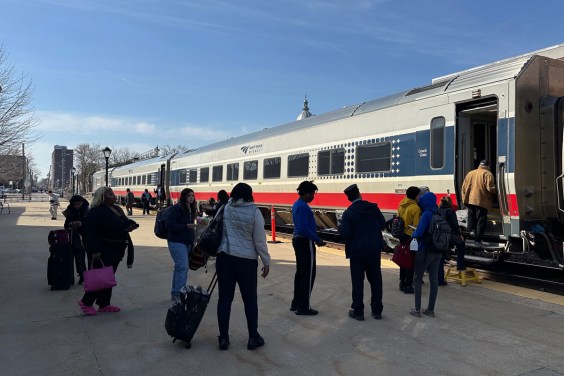In a report released this morning, Transportation for America (T4A) expands on its months-long effort to map transit cutbacks across the nation and concludes that 10 of the largest 25 local agencies are being forced to hike fares by more than 13 percent.
 (Photo: T4A)
(Photo: T4A)T4A's report illustrates the punishing effect of such cuts on transit riders, many of them low-income workers, with a set of well-trammeled statistics: demand hit a 50-year high in 2008; every dollar invested in transit produces an estimated $6 in economic growth; transit is far safer than car travel and provides greater public health benefits.
But when it comes to the political battle over remaking national transport priorities, T4A's transit cuts map -- viewable right here -- speaks loudest of all.
Transit fare increases and service reductions, T4A found, are concentrated in major cities and along the coasts. And as the current health care conflagration has shown, lawmakers rarely wield political power that's commensurate with the share of the population they represent.
As the Washington Post's Alec MacGillis catalogued in a commentary last week, Senate influence is particularly concentrated in the hands of small-state denizens such as Finance Committee Chairman Max Baucus (D) of Montana, who fought to remove a provision helping transit agencies with punitive tax shelters from last year's auto bailout bill.
Per MacGillis:
And then there's the Senate's age-old distortion of distributivepolitics, in which goodies are doled out on anything but a per-capitabasis. California, Illinois, New York and New Jersey are among the 10states that get the least back per tax dollar sent to Washington;Alaska, the Dakotas and West Virginia are among those that get themost.
In that context, it's not surprising that federal support for metro-area priorities such as transit is so perilously thin. Even in the House, where urban representatives lead several key committees, transit backers have yet to convince the Ways and Means panel to move forward with a solution to the immense revenue gap that has stalled progress on new long-term transport legislation.
A letter sent last month urging Ways and Means chairman Charles Rangel (D) -- who represents a transit-heavy district in New York City -- to press on with a transportation bill this year was signed by 15 of the committee's 26 Democrats. Yet metro-area members such as Rep. Pete Stark (D-CA), whose district is near Oakland, and Rep. John Lewis (D-GA) of Atlanta were absent.
And the legislation that T4A's report singled out as a concrete boost for transit agencies, Rep. Russ Carnahan's (D-MO) proposal to provide federal help with operating costs, does not count Rangel as one of its 60 co-sponsors. The bill also lacks a Senate counterpart, despite the presence of two transportation-minded Democrats in leadership positions (Banking Committee chairman Chris Dodd of Connecticut and Environment Committee chairman Barbara Boxer of California).
Of course, the political savvy of rural lawmakers does not automatically mean transportation reform must fall by the wayside; West Virginia Sen. Jay Rockefeller (D), chairman of the Commerce Committee, has taken the lead on a plan to set national performance targets for reductions in emissions and vehicle miles traveled.
Still, T4A's picture of cutbacks brilliantly illustrates where transit's congressional constituency should be leaping to its aid -- the question is what it would take to make that happen.





